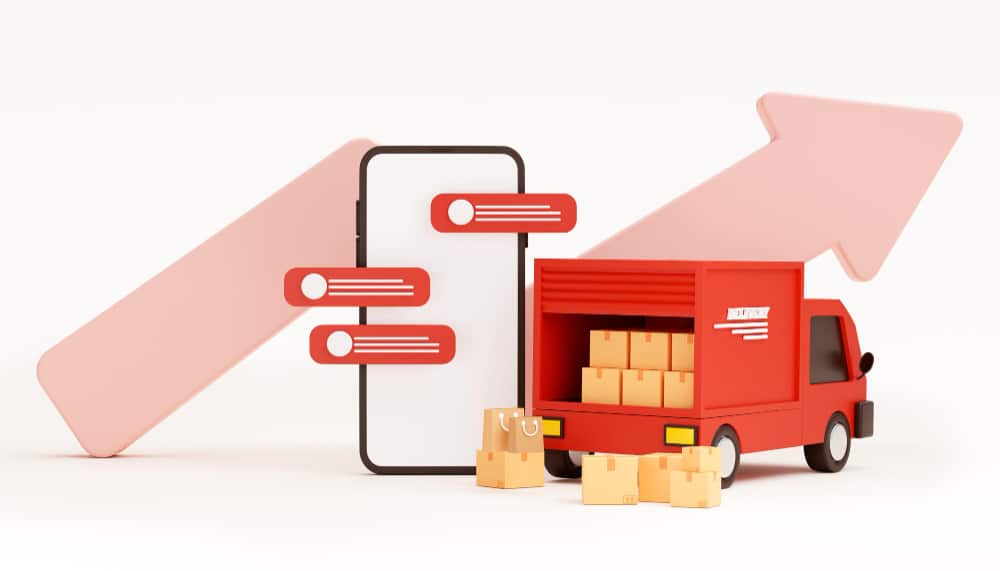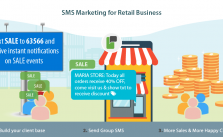Table of Contents
- Why SMS Marketing Matters in the Trucking Industry
- Getting Started with SMS Marketing for Trucking
- Best Practices for SMS Marketing in the Trucking Industry
- Real-World Examples of SMS Marketing in the Trucking Industry
- Advanced Strategies for SMS Marketing in Trucking
- The Future of SMS Marketing in the Trucking Industry
Effective communication is crucial in the trucking industry. Whether it’s keeping drivers updated, managing schedules, or staying in touch with customers, the ability to communicate efficiently can make or break a business. As the industry becomes more digital, SMS marketing has emerged as a powerful tool to streamline communication and enhance customer engagement. Here’s the complete guide for SMS marketing for the trucking industry!
This guide will walk you through everything you need to know about SMS marketing for the trucking industry, from its benefits and best practices to real-world examples and tips for success.

Why SMS Marketing Matters in the Trucking Industry
The trucking industry is the backbone of global commerce, responsible for transporting goods across vast distances. However, it is also an industry that faces unique challenges, including tight schedules, regulatory compliance, and the need for constant communication. In this context, SMS marketing offers a solution that is both practical and effective.
1. Instant Communication: The trucking industry operates in real-time. Delays, route changes, and urgent updates are a part of daily operations. SMS provides an instant communication channel that ensures critical information reaches drivers, dispatchers, and customers immediately. Unlike emails, which may go unread for hours, SMS messages are typically opened within minutes, making them ideal for time-sensitive communication.
2. High Engagement Rates: SMS boasts impressive engagement rates, with open rates as high as 98%. This makes it an excellent tool for reaching drivers and customers who are often on the move. Whether you’re sending a delivery confirmation, a route update, or a promotional offer, SMS ensures your message is seen and acted upon.
3. Cost-Effective Marketing: In an industry where margins can be tight, cost-effective marketing solutions are essential. SMS marketing is not only affordable but also delivers a high return on investment (ROI). With its ability to reach a large audience quickly and efficiently, SMS marketing can help trucking companies maximize their marketing budgets.
4. Improved Customer Satisfaction: Customer satisfaction is a key driver of success in the trucking industry. Customers want to be kept informed about their shipments, and they expect timely updates. SMS allows trucking companies to provide real-time notifications, improving transparency and building trust with customers.
Getting Started with SMS Marketing for Trucking
Implementing SMS marketing in the trucking industry requires a strategic approach. While SMS is a powerful tool, its effectiveness depends on how well it is integrated into your overall communication strategy. Here’s how to get started.
1. Choose the Right SMS Platform:
- The first step in launching an SMS marketing campaign is choosing the right platform. Look for an SMS marketing service that offers features tailored to the needs of the trucking industry. Key features to consider include message scheduling, automation, reporting, and the ability to segment your audience.
- Additionally, the platform should be user-friendly and offer robust customer support. Since the trucking industry operates around the clock, it’s important to have access to support when you need it.
2. Build a Compliant Contact List:
- Before you start sending SMS messages, you need to build a compliant contact list. In the trucking industry, this list may include drivers, dispatchers, customers, and other stakeholders. It’s crucial to ensure that everyone on your list has opted in to receive messages. This not only complies with regulations but also ensures that your messages reach an engaged audience.
- Encourage opt-ins by offering incentives, such as discounts or exclusive updates. Make it easy for people to sign up by integrating SMS opt-ins into your existing communication channels, such as your website or email newsletters.
3. Define Your SMS Marketing Goals:
- Like any marketing campaign, SMS marketing should start with clear goals. What do you want to achieve with your SMS marketing efforts? In the trucking industry, goals might include improving driver communication, reducing delivery times, increasing customer satisfaction, or boosting sales through promotional offers.
- Defining your goals will help you create targeted messages that resonate with your audience. It will also allow you to measure the success of your campaign and make adjustments as needed.
4. Segment Your Audience:
- Not all messages will be relevant to every contact on your list. Segmenting your audience allows you to send targeted messages to specific groups, increasing the relevance and effectiveness of your campaigns. For example, you might send different messages to drivers, dispatchers, and customers.
- In the trucking industry, audience segments could include drivers based on their routes, customers based on their order history, or dispatchers based on their role. By tailoring your messages to each segment, you can provide more value and improve engagement.
5. Craft Effective SMS Messages:
- SMS messages are limited to 160 characters, so it’s important to make every word count. Keep your messages concise, clear, and actionable. Use simple language and avoid jargon. Always include a call-to-action (CTA) that tells the recipient what you want them to do next.
- For example, a message to a driver might read: “Route change: Take Exit 42 for faster delivery. ETA updated in the app.” A message to a customer might say: “Your delivery is on the way! Track it here: [link].”
6. Schedule and Automate Messages:
- Timing is everything in SMS marketing. Scheduling your messages ensures they are sent at the optimal time, whether it’s a delivery update, a promotion, or a reminder. Automation takes this a step further by triggering messages based on specific actions or events.
- For instance, you can automate SMS notifications to customers when their shipment status changes or send reminders about their schedules to drivers. Automation not only saves time but also ensures that your messages are timely and relevant.
Best Practices for SMS Marketing in the Trucking Industry
While SMS marketing is a powerful tool, it’s important to use it wisely. Following best practices will help you maximize the effectiveness of your campaigns while maintaining compliance and customer trust.
1. Respect Privacy and Compliance:
- The trucking industry, like many others, is subject to strict regulations when it comes to communication. Ensure that your SMS marketing efforts comply with laws such as the Telephone Consumer Protection Act (TCPA) in the United States. This includes obtaining explicit consent from recipients before sending messages and providing an easy way to opt-out.
- Respecting privacy is not just about compliance; it’s also about building trust. Be transparent about how you will use recipients’ information and ensure that their data is stored securely.
2. Don’t Overwhelm Your Audience:
- SMS is a direct and personal communication channel, so it’s important not to overuse it. Bombarding your audience with too many messages can lead to frustration and opt-outs. Instead, focus on sending messages that provide real value, whether it’s a critical update, a time-sensitive offer, or important information.
- A good rule of thumb is to limit promotional messages to no more than one or two per week, while operational updates can be sent as needed.
3. Personalize Your Messages:
- Personalization is key to making your SMS messages resonate with your audience. Use the data you have to tailor messages to individual recipients. For example, you can address drivers by name, reference specific routes, or mention past interactions.
- Personalized messages feel more relevant and are more likely to drive engagement. Even something as simple as including the recipient’s name can make a big difference.
4. Monitor and Optimize Your Campaigns:
- SMS marketing is not a set-it-and-forget-it strategy. Regularly monitor the performance of your campaigns and use the data to make improvements. Key metrics to track include open rates, click-through rates, and conversion rates.
- If certain messages aren’t performing as well as expected, don’t be afraid to experiment with different wording, timing, or CTAs. A/B testing can be a valuable tool in optimizing your SMS campaigns.
5. Integrate SMS with Other Channels:
- While SMS is a powerful standalone tool, its effectiveness is amplified when integrated with other communication channels. For example, you can use SMS to follow up on an email campaign, remind customers about a promotion they received in their inbox, or direct them to a landing page for more information.
- Integration ensures a cohesive communication strategy, providing multiple touchpoints for engagement and reinforcing your message across channels.

Real-World Examples of SMS Marketing in the Trucking Industry
To understand the impact of SMS marketing in the trucking industry, let’s look at some real-world examples of how businesses are using this tool to enhance their operations and improve customer engagement.
1. Driver Communication: A large trucking company uses SMS to communicate with its fleet of drivers. By sending route updates, weather alerts, and schedule reminders via SMS, the company ensures that its drivers are always informed and can respond quickly to changes. This has led to reduced delivery times and improved overall efficiency.
2. Customer Notifications: A logistics provider uses SMS to keep customers updated on the status of their shipments. Customers receive SMS notifications when their shipment is picked up, when it’s out for delivery, and when it has been delivered. This transparency has increased customer satisfaction and reduced the number of inquiries to customer service.
3. Promotional Campaigns: A trucking equipment supplier uses SMS to promote special offers and discounts to its customers. By sending targeted messages to customers based on their purchase history, the supplier has seen asignificant increase in sales during promotional periods. The targeted nature of these campaigns ensures that the messages are relevant to the recipients, leading to higher engagement and conversion rates. For example, customers who previously purchased specific truck parts receive SMS offers for related accessories, encouraging repeat business and fostering customer loyalty.
4. Recruitment and Staffing: A trucking company facing driver shortages implemented an SMS-based recruitment campaign. By sending out job alerts to a database of potential candidates, the company was able to quickly fill open positions. The SMS messages included direct links to job applications, making it easy for interested candidates to apply on the spot. This approach not only sped up the recruitment process but also reached a wider audience than traditional methods.
Advanced Strategies for SMS Marketing in Trucking
Once you’ve mastered the basics of SMS marketing, it’s time to explore more advanced strategies that can take your campaigns to the next level. These strategies are designed to enhance your communication efforts, improve customer engagement, and drive long-term success.
1. Implement Drip Campaigns:
- Drip campaigns are a series of automated SMS messages that are sent out over time, based on specific triggers or customer actions. In the trucking industry, drip campaigns can be used for onboarding new drivers, nurturing leads, or maintaining customer engagement. For example, a new customer might receive a series of SMS messages that welcome them to the service, provide tips for tracking shipments, and offer discounts on their next order.
- Drip campaigns help maintain consistent communication with your audience without overwhelming them. By delivering the right message at the right time, you can build stronger relationships and keep your audience engaged throughout their journey with your brand.
2. Use Geofencing for Location-Based Messaging:
- Geofencing is a powerful technology that allows you to send SMS messages to recipients based on their geographic location. In the trucking industry, this can be particularly useful for sending location-based updates or offers. For example, a driver entering a specific region could receive a message with information about nearby rest stops, fueling stations, or service centers.
- Geofencing can also be used to trigger customer notifications when a delivery truck is approaching their location. This level of precision enhances the customer experience by providing timely and relevant information.
3. Leverage Two-Way Messaging for Better Engagement:
- While most SMS marketing campaigns focus on one-way communication, two-way messaging opens up a dialogue between your business and your audience. In the trucking industry, two-way messaging can be used for customer service, driver communication, or gathering feedback. For example, customers can reply to an SMS to reschedule a delivery, ask a question, or provide feedback on their experience.
- Two-way messaging not only improves engagement but also enhances the overall customer experience by making it easier for customers and drivers to communicate with your business.
4. Integrate SMS with CRM Systems:
- Integrating SMS marketing with your Customer Relationship Management (CRM) system allows you to create more personalized and targeted campaigns. By syncing your SMS platform with your CRM, you can use customer data to segment your audience, track interactions, and trigger automated messages based on specific criteria. For example, a CRM integration could automatically send an SMS reminder to a customer whose shipment is delayed or notify a dispatcher when a driver’s certification is about to expire.
- This integration streamlines your operations and ensures that all communications are informed by up-to-date customer and driver data.
5. Analyze and Optimize Your Campaigns:
- Advanced SMS marketing involves continuous analysis and optimization. Use the data collected from your SMS campaigns to identify trends, measure performance, and make data-driven decisions. For instance, if you notice that messages sent at a particular time of day have higher engagement rates, you can adjust your scheduling accordingly.
- Regularly review your SMS marketing strategy to identify areas for improvement. This might include refining your message content, experimenting with new CTAs, or testing different audience segments. By continuously optimizing your campaigns, you can maximize their effectiveness and achieve better results over time.
The Future of SMS Marketing in the Trucking Industry
As technology continues to evolve, so too will the role of SMS marketing in the trucking industry. The future holds exciting possibilities, including the integration of SMS with emerging technologies like artificial intelligence (AI) and the Internet of Things (IoT). These advancements will enable even more personalized, efficient, and impactful communication strategies.
1. AI-Powered SMS Campaigns:
- Artificial intelligence is poised to revolutionize SMS marketing by enabling more sophisticated targeting and automation. AI can analyze vast amounts of data to predict customer behavior, optimize message timing, and personalize content at scale. In the trucking industry, AI could be used to automatically adjust communication strategies based on real-time data, such as traffic patterns or weather conditions.
- AI-driven SMS campaigns will allow trucking companies to stay ahead of the curve, delivering more relevant and timely messages that drive engagement and improve operational efficiency.
2. Integration with IoT Devices:
- The Internet of Things is already transforming the trucking industry, with smart devices providing real-time data on everything from vehicle performance to cargo conditions. Integrating SMS marketing with IoT devices offers new opportunities for real-time communication. For example, sensors in a truck could trigger an SMS alert to the driver if tire pressure drops, or to a customer if their shipment temperature exceeds a certain threshold.
- This integration will enhance the ability to provide proactive and responsive communication, ensuring that issues are addressed before they escalate and that customers are kept informed every step of the way.
3. Expanding Global Reach:
- As the trucking industry becomes more globalized, SMS marketing will play a key role in reaching customers and drivers across different regions and time zones. The simplicity and universality of SMS make it an ideal tool for international communication. As global SMS platforms continue to improve, trucking companies will be able to maintain consistent communication with their global workforce and customer base, regardless of location.

Final Thoughts!
SMS marketing is a powerful tool that offers numerous benefits to the trucking industry. From improving communication and enhancing customer satisfaction to driving sales and increasing operational efficiency, SMS is an essential component of a modern trucking business strategy. By following the guidelines outlined in this guide, you can implement a successful SMS marketing campaign that meets the unique needs of the trucking industry.
As you adopt SMS marketing, remember to stay compliant with regulations, personalize your messages, and continuously optimize your campaigns. By doing so, you’ll not only improve engagement but also build stronger relationships with drivers, customers, and other stakeholders. The future of the trucking industry is digital, and SMS marketing is a key part of that future.
Now is the time to leverage the power of SMS to take your trucking business to the next level. Start today, and watch your communication, customer satisfaction, and business success soar!






